
Future-proofing your EU funding strategy for the post-2027 period
Preparing for EU funding for the post-2027 period? Learn what organisations can do now to align with policy shifts, build partnerships and strengthen readiness.
The EU Funding & Tenders Portal always features a range of open funding opportunities, but not necessarily in your specific thematic area at any given time. Most EU programmes launch Calls for Proposals on an annual basis—or even less frequently—meaning that if you have a great project idea, there’s a good chance no relevant Call is currently open to which you could apply right away. What is often overlooked is that having more time allows you to lay the groundwork to set your EU proposal up for success already ahead of the Call opening.
When a Call for Proposal that would be suitable for your project is not open yet, and without alternative funding sources, the natural response is often to wait for the next Call. However, given the intense competition and tight deadlines and the often underestimated time needed to coordinate and finalise a proposal after a Call is announced, using the available time wisely can significantly increase your chances of success.
In fact, the most successful applicants are those who do not wait until the official Calls for proposals are published. Instead, they prepare strategically in advance by refining their project concepts, strengthening partnerships and aligning with EU priorities. If your organisation is looking to secure EU funding, what you can do is to get ahead of the competition and be ready when the Calls are finally launched.
Before drafting an EU funding proposal, you need to clearly define the problem your project seeks to address. This step is crucial because EU funding programmes prioritise projects that demonstrate a well-defined need and a clear strategy for achieving impact.
How to specify the problem effectively:
EU funding programmes are highly competitive. In most cases, only a small fraction of proposed projects will indeed get funded. An essential element of a successful proposal is its alignment with current EU priorities and policies. By aligning your project with EU priorities, you increase its relevance and demonstrate to evaluators how it contributes to broader policy goals.
It is therefore important to know the main or overarching strategic policy frameworks and review key EU documents which are related to the policy area your project would belong into, or would have an effect on. Examples are the EU Green Deal/ Clean Industrial Deal, Farm to Fork Strategy, or the EU Charter for Fundamental Rights, Strategy for the Rights of Persons with Disabilities, and other.
Follow policy developments and stay updated on European Commission announcements, sector-specific strategies, and draft work programmes if they are available. For instance, at the time of writing of this article, Science Business regularly publishes unofficially obtained “leaked” draft work programmes for Horizon Europe. A word of caution here: It could happen that the content will have changed in the final version and in the worst case scenario a topic you are interested in may have been scrapped. However, such drafts may well serve as an orientation.
Once the problem is well-defined, outline the expected impact of your project and how it will be achieved. Maps out how your proposed activities will lead to measurable short-term and long-term outcomes. Be specific about:
Many EU funding programmes, especially Horizon Europe, require international and multi-stakeholder collaborations. A well-structured consortium of complementary partners enhances the credibility and feasibility of your planned project.
How to build a strong consortium:
By preparing your consortium in advance, you save valuable time once the Call is published and increase your chances of submitting a compelling proposal.
Each EU funding Call includes detailed guidelines covering eligibility criteria, evaluation processes, page limits and formatting requirements. While the Call document itself is not available yet before a Call is published, it can still be worthwhile to check previous Calls of very similar topics.
Moreover, the EU Funding & Tender Portal has a section on “reference documents” which you can already check out, such as guidance, manuals and reference documents for each of the EU programmes, for example in view of understanding evaluation criteria.
Rather than waiting for the official Call to open, you can already start drafting key sections of your proposal early. Many parts of an EU proposal require thoughtful planning, and working on them in advance will streamline the final application process.
Elements you can prepare already:
Preparing these sections in advance allows you to refine your ideas and avoid last-minute stress when the Call is finally released.
Many organisations miss out on EU funding due to unclear proposals, not addressing all evaluation (sub-)criteria, or missing key strategic elements. Working with an EU funding expert or grant writer can significantly enhance the quality and competitiveness of your application.
How an expert can help:
Investing in professional support can be the decisive factor in transforming your application into a winning proposal.
Waiting for the next Calls for Proposals doesn’t mean standing still. The organisations that win funding are those that prepare in advance, align their projects with EU priorities and position themselves strategically for success.
Just to be clear, I’m not suggesting you draft an entire proposal before the Call even opens – that wouldn’t be the wisest move. After all, the proposal will always need some fine-tuning to align with the (published) Call text, factoring in all its nuances and subtle cues about what’s actually expected for a winning project.
That said, by engaging early you can:
✅ Define your project’s goals and expected impact
✅ Align with EU policy goals
✅ Build strong partnerships
✅ Study key documents
✅ Draft core proposal sections early
✅ Seek expert guidance
… you can simplify your writing process once the application opens. This will help you craft a well-structured, clear and impactful proposal, maximising your chances of securing EU funding.
Would you like to get a deeper understanding what is expected in a proposal? Get the new Quick Guide “Impact, Outcome & Co: Your Compact Guide to Avoiding Mixing Up the 10 Fundamental EU Funding Terminologies and Addressing Them Correctly In Your Proposal”.

Author: Astrid Mechel
https://eufundingconsulting.eu
Hello, I am Astrid Mechel and I work (for the most part) with small and medium sized organisations who aim to access EU funding. It is my goal to help discovering suitable EU project funding possibilities and to provide support to submit a high-quality grant application. My main thematic focus is on grants for research and innovation, environmental sustainability as well as on social inclusion and participation.
Read more articles here:

Preparing for EU funding for the post-2027 period? Learn what organisations can do now to align with policy shifts, build partnerships and strengthen readiness.

EU project funding for nonprofits: Discover 6 misconceptions that hold organisations back and how to turn them into opportunities for growth and impact.

Applying for EU funding can be a complex and challenging. This article offers 12 practical tips to help you avoid the most common stumbling blocks.
Online Workshop
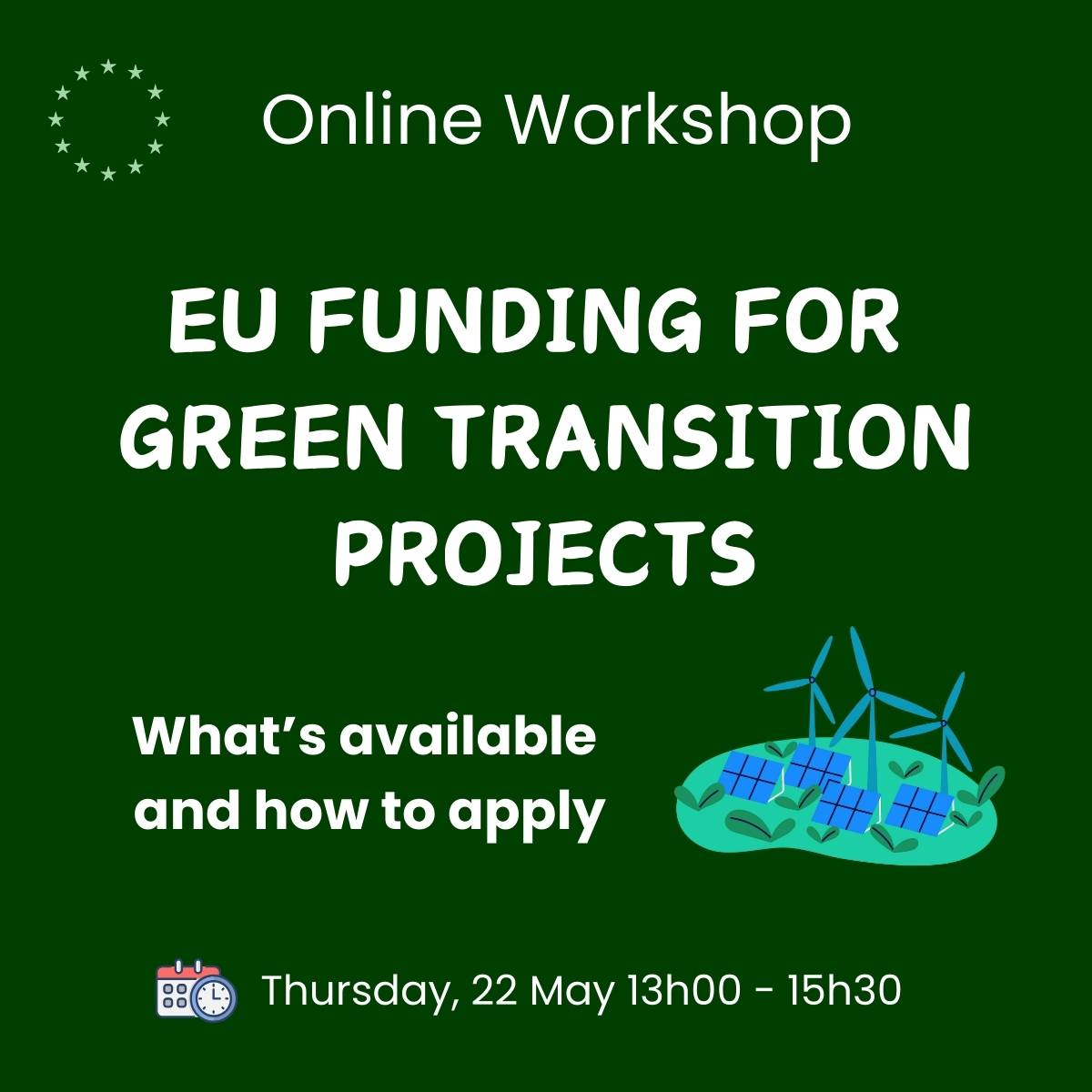
Interactive Live Workshop
On 22 May 2025 from 13h00-15h30
Registrations are closing soon
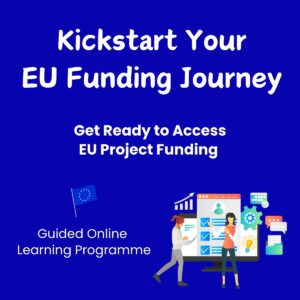
Curious about EU funding and how it could support your next project? Join the new live programme round for a compact and easy-to-follow way to get started with EU funding.
Key Terminologies – Application Guidance
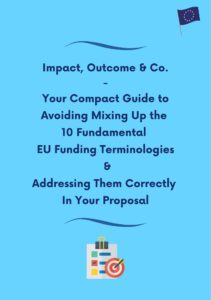
This guidance compares and compare and clarifies the 10 key terminologies within an EU funding application. How should you address them in your proposal, and what kind of information belongs to which one of them?
Online Workshop on 6 November!
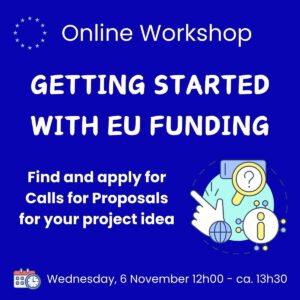
The workshop “Getting Started with EU Funding” is for participants with no or very limited experience in EU funding. Discover what kind of projects the EU is funding, the requirements and how you can apply for funding in your thematic field.
EU Funding Checklist
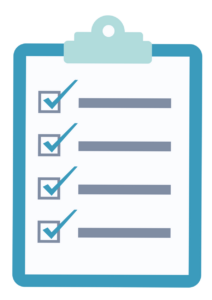
Do you have a new project idea and are wondering if EU funding could be available for your project?
This checklist will guide you through the most important questions to be considered when applying for EU project grants and includes some further suggestions how you could adapt your concept to be more in line with EU expectations regarding fundability.
Get the brand new upgraded guidance booklet (free offer):
Your compact guide on how they work and how your organisation can apply for funding
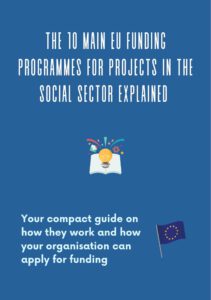
Find out which 10 EU programmes offer grants for projects in the social sector, what the conditions for funding are and how you can apply.
Online Workshop
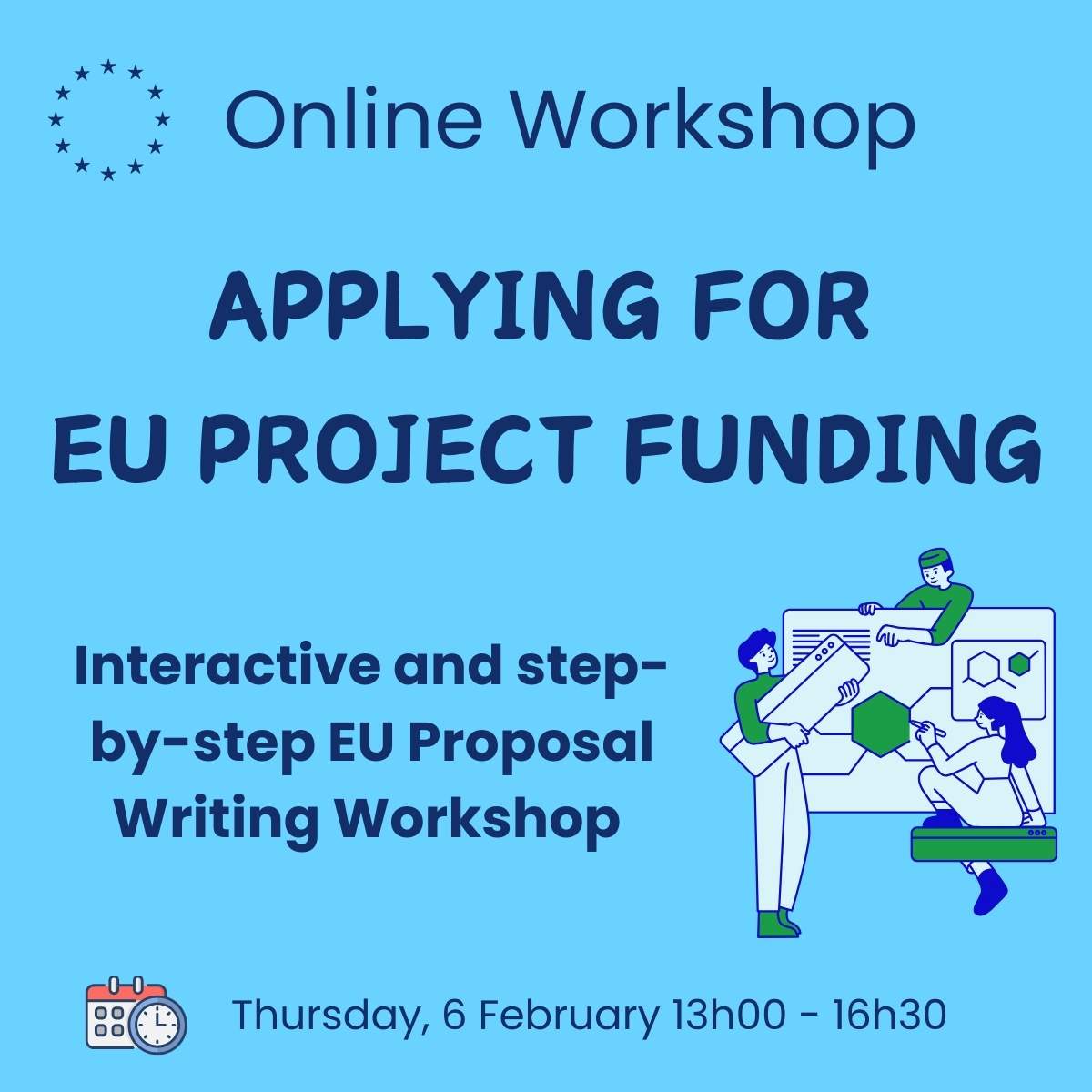
Interactive and step-by-step EU Proposal Writing Workshop
On 6 February 2025 from 13h00-16h30